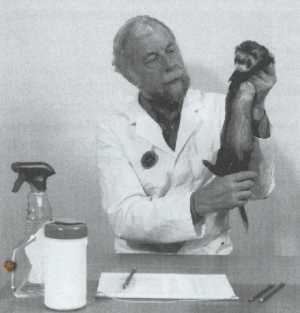Back to Basics - Internal Parasites
 Dr Jeff Lewis, a parasitologist, tells us how to make sure our ferrets are not prey to nasty internal visitors.
Dr Jeff Lewis, a parasitologist, tells us how to make sure our ferrets are not prey to nasty internal visitors.
Following on from the last issue's topic of external parasites, ferret owners may like to know that a drop of Frontline* in the ferret's ears is very successful at clearing earmites. If you have never used Frontline before, I suggest you use it on your ferret's coat first to make sure there's no problem but after that you can do flea, tick and earmite treatment in one adminstration in late spring/early summer and perhaps a second treatment later in the year if required.
Anyway, on to the guts of this issue's Back to Basic (every pun intended) - internal parasites. The most common forms of internal parasites are various types of worms and protozoa.
One of the most frequently asked questions on this subject is: 'Do I need to worm my ferrets?' The not-so-simple answer is: 'It depends'. Quite simply, not many ferrets are reported with worms, but that doesn't mean they can't or don't get them. Most mammals, especially carnivores, can be hosts to lots of parasitic worms. In theory, the ferret is susceptible to most parasites of the dog and cat. Whether your ferret is likely to get worms depends on his environment, his behaviour and his diet. If I describe some of the worms and how they are contracted, you'll see what I mean
ROUNDWORMS
There are various sorts of roundworms common in dogs and cats that could also infect ferrets. Some varieties live in the small intestine and lay eggs which pass out in the host animal's faeces. These eggs become infective in just a couple of days and, if ingested by another animal, can either develop in the new host's intestine, or, if that animal is eaten by a predator, infection will pass to the predator. Ferrets could become part of this chain by eating creatures that have themselves eaten infected faeces from cats and/or dogs. These include earthworms, slugs, snails, beetles, rodents or birds. Eggs not eaten can remain dormant in soil for several years so if your ferret roams in areas where cats or dogs have defecated or if your ferret is inclined to have an illicit feast of slug, snail, worm, beetle, rodent etc, then it would be a good idea to worm your ferret.
It is also worth remembering that some species of roundworm are transmissible to humans, resulting in the tragic cases of blindness through Toxocara infection where the worn larvae migrate to the eye. Since worms can often go undetected unless adult worms are vomited or passed in faeces, it is probably best to assess the risks to your ferret to decide whether or worm him or not. If he comes in contact with other animal faeces (cat, dog, fox etc), if he's the sort to grab a creepy crawly as a snack, or if you feed him on wild caught carcase, then ask your vet gor a worming treatment. On the whole, the prescription wormers are much more effective than over-the-counter ones. A wormer for cats and kittens is usually used.
TAPEWORMS
These are segmented worms that can be over a foot long. They live in an animal's intestines and shed segments loaded with eggs which pass out with the faeces
One type of tapeworm is spread by fleas. Flea larvae eat the eggs excreted by the host (usually a cat, dog or fox but occasionally other mammals) and these eggs mature as the flea larvae develop into adult fleas which jump on to a suitable host for them to feed on. When that animal grooms and bites at or swallows the flea, the tapeworm eggs are released and go on to develop into mature worms.
Another type of tapeworm does not have the flea as an intermediate host. Instead it relies on rats, mice, and voles to eat the segments secreted in the host animal's faeces. These form a small cyst in the rodent's liver. When a predator eats the rodent the cyst releases the eggs in the segments allowing them to mature into adult tapeworms.
Again, some tapeworms can be transmitted to humans, so do assess the risks to your ferret with your own health in mind too.
Other worms are less common in this country but they can occur in ferrets. Many are transmitted through slugs, snails, earthworms and other small creatures that act as intermediate hosts. When these are eaten, the life cycle of the parasitic worm completes itself in its new host.
Protozoan disseases are also transmitted through intermediate hosts such as mice.
TOXOPLASMOSIS
This is a disease caused by an intracellular parasite called Toxoplasma gondii. Its primary host is the cat. This is the disease that can cause so much harm to pregnant women as the parasite has severe effects on the developing human foetus. It is spread through infected cat faeces which are ingested by other animals, especially mice and rats. When a cat eats the infected rat or mouse, the life cycle of the parasite continues. Ferrets have been infected experimentally and so have been shown to be susceptible. In fact, there are two ways the ferret could become a part of the disease process, by eating or accidentally ingesting the infected faeces or by eating a rodent that has done so.
Similar pathways are indicated in other protozoan diseases. Giardia and Isospora (coccidiosis) have both received attention from parasitologists looking into the ferret as possible host.
So, back to the original question: 'Do I need to worm my ferret?' If your ferret does not go out and about where dogs and cats have been; you are certain it doesn't have a munch on any passing slug, snail, mouse or whatever; and you don't feed it wild carcase, and it never has fleas, the answer is probably that it wouldn't be necessary. However, for any ferret who does do any of those things and for all working ferrets I would advise a regular programme of worming. Don't forget if you have cats and dogs you need to worm all the animals at the same time. The same has to be said for flea control. Eliminating fleas will stop the transmission of at least one species of tapeworm but you will have to treat all the animals in your household.
As far as the protozoan diseases are concerned, the position with ferrets is unclear as yet, but I would suggest that ferrets living with cats might be more susceptible through contact with cat litter trays and small animals killed by cats. If your ferret show signs of illness such as anaemia, lethargy, respiratory problems and fever, and you suspect he might have been in contact with cat faeces or eaten a cat's kill, you should certainly contact your vet. Coccidiosis is most common in your animals, especially from pet shops or breeding units. The first sign is usually bloody diarrhoea. Your vet will prescribe sulphonamide drugs, possibly for some weeks to ensure the disease is cleared up.
Like anything medical or veterinary, things look bad when put down on paper, but a simple routine of worming and flea control, together with good hygiene, will mean the only livestock you are caring for are the ones you want!
* Check with your vet first but this treatment is in the BSAVA Manual
